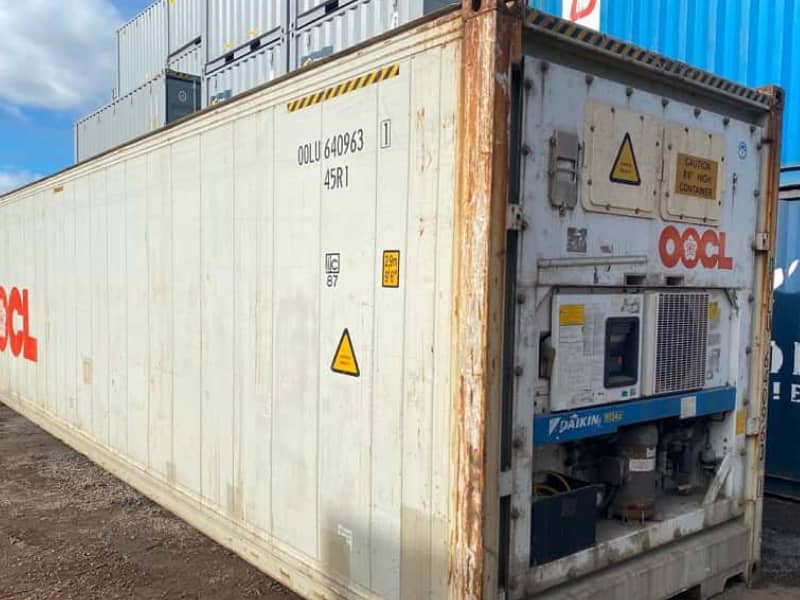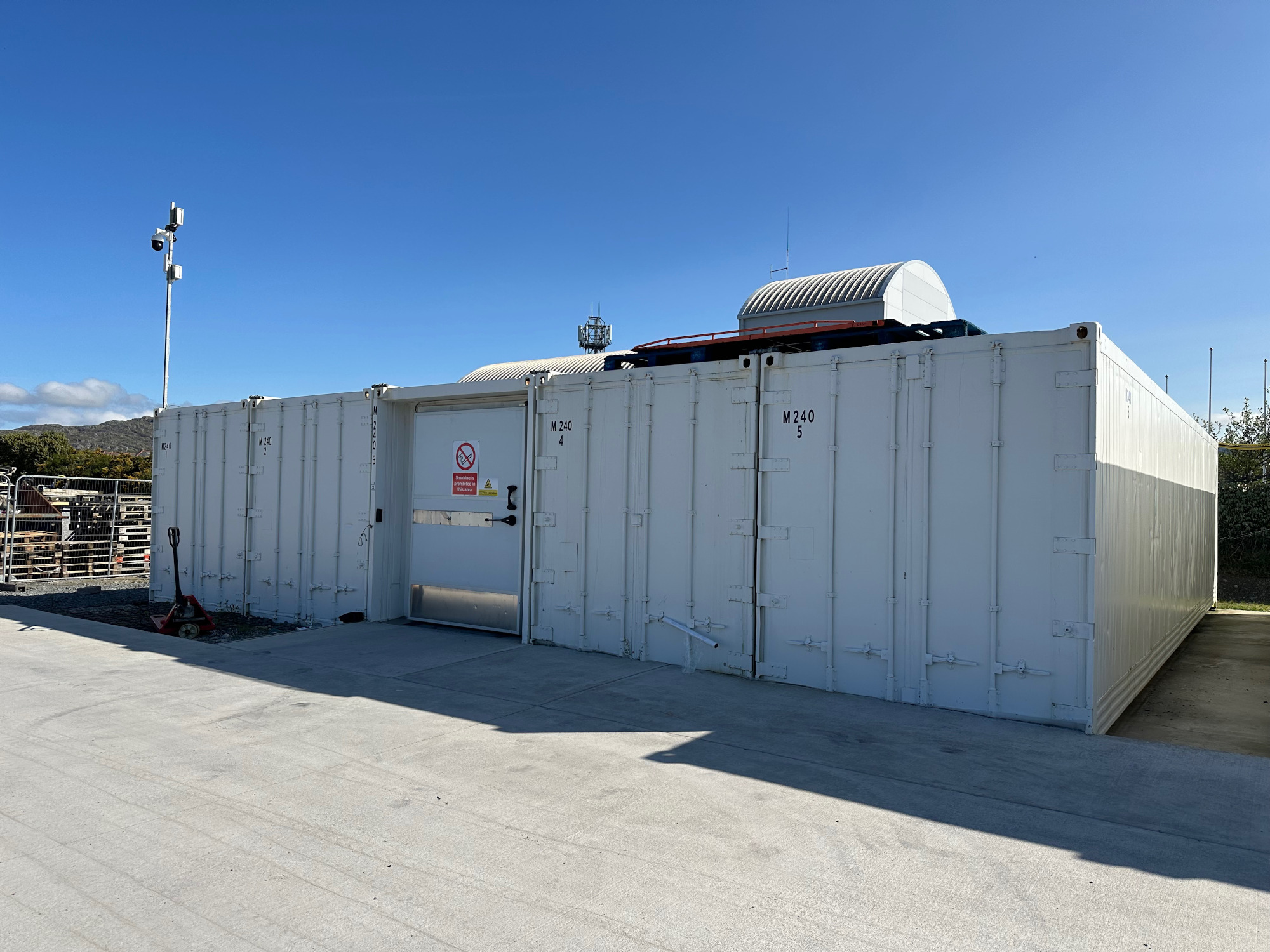Choose trusted used 40ft refrigerated shipping containers for storage growth
Everything About Cold Store Containers: Vital Insights for Your Storage Requirements
Cold storage containers play a vital duty in the preservation of disposable goods. They are available in numerous forms, consisting of cooled and insulated devices, each developed for specific storage space requirements. Recognizing the advantages and crucial functions of these containers is necessary for companies aiming to enhance their operations. As the need for efficient storage space solutions expands, exploring the various alternatives available can cause informed decisions that affect both earnings and sustainability. What elements should one consider when selecting the right container?
Sorts Of Cold Store Containers
Cold store containers been available in various types, each created to fulfill certain temperature level control demands. Amongst one of the most usual kinds are cooled containers, which maintain temperatures in between 0 ° C to 10 ° C, making them ideal for disposable products like fruits, vegetables, and dairy items. One more kind is the deep freezer container, which runs at temperatures below -18 ° C, perfect for long-lasting storage of icy items such as meats and fish and shellfish.
Shielded containers supply temperature level stability without energetic air conditioning, making them valuable for temporary transportation of temperature-sensitive items. In addition, there are mobile freezer systems, which use versatility in places and are usually made use of in occasions or seasonal operations. Blast chillers swiftly minimize the temperature of hot foods, guaranteeing safety and high quality. Each kind offers a distinct purpose in various sectors, from food solution to pharmaceuticals, emphasizing the value of choosing the right container for specific storage needs.

Benefits of Making Use Of Cold Store Solutions

Moreover, cold store services expand the service life of items, minimizing waste and boosting success for organizations. By efficiently handling inventory with appropriate temperature control, companies can enhance their supply chains and enhance operational performance.
Additionally, cool storage facilities permit versatile storage options, fitting numerous volume demands and seasonal changes sought after (used 40ft refrigerated shipping containers). This flexibility assists organizations react promptly to market modifications
Utilizing cool storage services can assure conformity with health and safety guidelines, guarding both companies and consumers. Generally, the critical use cold storage boosts product management while promoting sustainability and economic feasibility.
Secret Functions to Seek in Freezer Containers
When picking cold store containers, a number of vital features benefit cautious factor to consider to secure peak performance and dependability. Temperature control capabilities are important; containers ought to maintain regular temperature levels appropriate for certain products. Insulation quality likewise plays a substantial duty, as premium insulation minimizes energy usage and enhances temperature security.
Next, ease of access and loading is crucial; containers should supply straightforward styles for reliable handling and organization. Sturdiness is another vital aspect; weather-resistant products ensure longevity and guard components versus ecological elements.
Additionally, flexibility functions, such as built-in wheels or lifting points, facilitate transportation, while customizable layouts enable tailored storage space services.
Last but not least, keeping track of systems, consisting of temperature level alarms and remote monitoring, provide real-time updates, making particular that problems remain suitable. By concentrating on these features, individuals can pick freezer containers that meet their operational needs efficiently.
Picking the Right Freezer Container for Your Demands
Choosing the ideal freezer container requires a thoughtful analysis of operational demands and details needs. Elements such as the kind of items being saved, temperature sensitivity, and quantity needs to be focused on. For example, perishable food items might require containers with rigid temperature level controls, while pharmaceuticals may require specific conditions to maintain effectiveness.
Additionally, potential users ought to take into consideration the container's dimension and mobility. A bigger unit may be necessary for bulk storage space, while smaller, mobile alternatives can be ideal for on-site or momentary requirements. Insulation high quality and energy efficiency are also crucial, as these will impact operational prices and temperature level security.
Last but not least, conformity with sector laws and standards is crucial, particularly in fields like food and medical care. By thoroughly assessing these facets, customers can choose a cold storage space container that successfully satisfies their unique needs and assurances optimum storage space conditions.
Ideal Practices for Preserving Freezer Issues
Preserving perfect cold store problems is essential for preserving the top quality and safety of temperature-sensitive items. On a regular basis checking temperature and moisture levels is essential; utilizing reliable electronic thermometers and hygrometers can supply accurate readings. Appropriate insulation of cool storage space containers helps decrease temperature variations and power loss.
Executing a first-in, first-out (FIFO) system guarantees that older supply is used before more recent supply, reducing waste (used 40ft refrigerated shipping containers). Furthermore, keeping an organized design within the storage official source area enables far better air movement and decreases the risk of cross-contamination
Routine maintenance look at tools, such as compressors and seals, are essential to stop breakdowns. Staff training on best methods for packing and dumping products aids preserve temperature level stability. Ultimately, keeping doors closed as long as feasible limits heat exchange, ensuring that the cold storage atmosphere remains reliable and stable in protecting beneficial items.
Price Considerations for Cold Store Solutions
When reviewing cold storage services, it is essential to think about the first financial investment prices alongside recurring functional costs. A thorough failure of these costs can reveal substantial lasting cost savings potential for services. Comprehending these financial facets assists stakeholders make informed choices concerning their cold store demands.

First Investment Costs
The economic landscape of cold store containers provides different initial investment prices that businesses must consider. These prices typically include the purchase or rental price of the containers, which can vary based upon type, size, and insulation top quality. In addition, costs associated with retrofitting existing structures to accommodate freezer needs to be factored in, especially if specialized equipment is required. Installation prices, including electrical job and refrigeration systems, additionally add to the overall initial financial investment. Businesses need to not ignore transportation costs for supplying containers to their desired place. Finally, possible personalization options, such as shelving or temperature level surveillance systems, can better affect the preliminary financial expense. Careful budgeting for these factors is crucial for effective cold store execution.
Operational Expenditures Failure
Operational costs for cold storage solutions include numerous important cost factors to consider that organizations should browse. Key elements consist of energy prices, which can be substantial because of the demand to maintain low temperature levels. Maintenance expenses are additionally significant, as routine maintenance is important to guarantee equipment operates effectively and continues to be compliant with health and wellness and safety and security criteria. Additionally, labor expenses might arise from the demand for specialized personnel to manage and monitor the storage setting. Insurance expenses are another consideration, as firms must protect their investments against potential losses. Lastly, any type of possible governing conformity prices need to be factored in, as organizations might require to spend in systems that abide by food safety and security and environmental guidelines. Understanding these expenditures is critical for reliable budgeting.
Long-Term Financial Savings Prospective
Investing in cold storage space remedies uses significant long-lasting savings potential, changing preliminary expenses right into monetary efficiency with time. By decreasing wasting and waste, services can improve their profit margins considerably. Advanced insulation and energy-efficient systems lower utility costs, which accumulate over the life-span of the devices. Cool storage containers often call for less constant maintenance contrasted to conventional refrigeration approaches, leading to reduced repair costs. The ability to store items for extended durations without compromising top quality allows services to capitalize on market changes, optimizing profits. In addition, the scalability of chilly storage space solutions allows companies to adjust to altering needs without sustaining excessive expenses. In general, these variables contribute to an engaging instance for cold storage as an economical financial investment strategy.
Often Asked Inquiries
Just How Lengthy Can Food Be Stored in Freezer Containers?
The period food can be saved in cold store containers varies by type. Normally, disposable things last from days to weeks, while frozen foods can remain risk-free for months, depending upon correct temperature and storage problems.
Are Freezer Containers Energy-saving?
The power performance of cold store get redirected here containers varies based on layout and insulation top quality. Modern devices typically use innovative technology to decrease power intake, eventually adding to lowered functional costs and environmental impact in long-term use.
Can Cold Storage Containers Be Customized for Specific Demands?
Freezer containers can indeed be customized to meet particular requirements. Modifications may consist of temperature level controls, dimension modifications, and extra functions, allowing users to customize options successfully for different storage requirements and functional preferences.
What Are the Common Dimensions of Cold Store Containers?
Freezer containers generally come in standard dimensions such as 10, 20, and 40 feet. These measurements fit various storage space demands, making sure flexibility for businesses useful link requiring temperature-controlled atmospheres for perishable items or delicate products.
Do Cold Store Containers Require Unique Authorizations for Use?
Cold store containers usually need unique permits for usage, depending on regional regulations and meant applications. Authorities may mandate authorizations to ensure safety and security requirements, ecological compliance, and appropriate functional practices are kept during their application.
Cold storage space containers come in different types, each created to fulfill certain temperature level control demands. Furthermore, cold storage centers allow for versatile storage space options, fitting numerous volume requirements and seasonal variations in demand. Selecting the appropriate chilly storage space container requires a thoughtful assessment of details needs and operational demands. The economic landscape of cool storage containers provides different preliminary financial investment costs that services have to consider. Cold storage containers can certainly be personalized to satisfy details needs.